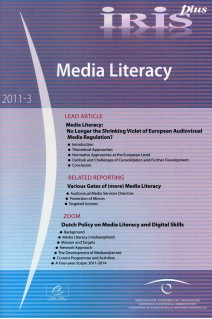One of the most important social changes of the past two decades is the development of the so-called information society.The choice of the term "information society" lays particular emphasis on the supply aspect of this development: the increasing amount of available information in the broadest sense, as well as the growing number of ways in which we can access this information. However, in order to take full advantage of this explosion of information, a form of literacy is required, which is the subject of this edition of IRIS plus: media literacy.
LEAD ARTICLE
Media Literacy: No Longer the Shrinking Violet of European Audiovisual Media Regulation?
The political will to include media literacy in the catalogue of social objectives dates back to before the digital media era began. However, it has become particularly relevant as a result of the digitisation and democratisation of online media, which is producing a brand new form of social division and exclusion. Since the concept of "media literacy" was expressly included in the EU Audiovisual Media Services Directive, if not before, it has become one of the most important subjects of media policy and regulatory activities at European and national levels.
The lead article provides an overview of the debate and the legal developments that are paving the way for greater literacy in relation to modern media.






